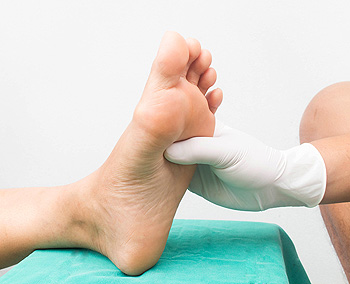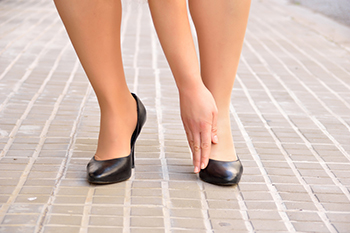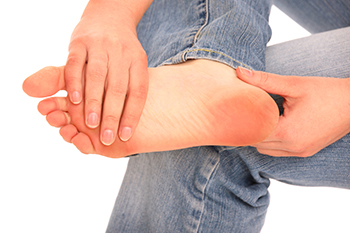

Psoriasis is a skin condition that causes red patches of skin with silvery scales. Psoriatic arthritis or PsA is a kind of inflammatory arthritis that affects people who suffer from psoriasis. PsA causes pain, swelling, and tenderness in joints, and it can affect the feet, toes, and toenails. In fact, these are some of the unique traits of this type of arthritis. When PsA leads to swelling of the toes, it is called dacylitis of the toes. This swelling, caused by tenosynovitis or inflammation of the tendon sheath, usually impacts the entire toe rather than a single joint, and the toe can look like a sausage. Psoriatic arthritis can also result in swelling and tenderness in the ankles and heels, accompanied by a red or purple tint of the skin. Furthermore, PsA sufferers can develop enthesitis, which is inflammation where the tendons and ligaments connect with bone. This often affects one's Achilles tendon, which connects the heel to the calf muscles. This, too, leads to swelling and pain in the back of the heel and ankle, as well as the sole of the foot. The effects on the feet from psoriatic arthritis are numerous. If you have developed this condition, it is strongly suggested that you have a podiatrist on your medical team who can help you navigate the uncomfortable symptoms you may feel.
Arthritis can be a difficult condition to live with. If you are seeking treatment, contact one of our podiatrists from Grand Blanc Family Footcare. Our doctors can provide the care you need to keep you pain-free and on your feet.
Arthritic Foot Care
Arthritis is a term that is commonly used to describe joint pain. The condition itself can occur to anyone of any age, race, or gender, and there are over 100 types of it. Nevertheless, arthritis is more commonly found in women compared to men, and it is also more prevalent in those who are overweight. The causes of arthritis vary depending on which type of arthritis you have. Osteoarthritis for example, is often caused by injury, while rheumatoid arthritis is caused by a misdirected immune system.
Symptoms
Arthritic symptoms range in severity, and they may come and go. Some symptoms stay the same for several years but could potentially get worse with time. Severe cases of arthritis can prevent its sufferers from performing daily activities and make walking difficult.
Risk Factors
If you suspect your arthritis is affecting your feet, it is crucial that you see a podiatrist immediately. Your doctor will be able to address your specific case and help you decide which treatment method is best for you.
If you have any questions, please feel free to contact our office located in Grand Blanc, MI . We offer the newest diagnostic and treatment technologies for all your foot care needs.

Many people who have diabetes also struggle with secondary conditions that affect the lower limbs, feet, and toes. Among these are nerve damage, circulation problems, and infections. Nerve damage is the result of long-term high blood sugar levels, which leave the patient with numbness in the feet. This neuropathy can open the door to cuts or sores that cannot be felt and therefore go untreated. It can also cause damage to the bones and joints of the legs and feet. Blocked arteries are also caused by high blood sugar levels, making it more difficult for blood to reach the toes and feet. This makes it difficult for sores and cuts to heal properly, and they can develop into skin ulcers. If not dealt with promptly, ulcers can ultimately lead to developing gangrene. High blood sugar also can put the diabetic at more risk of infection. If you are experiencing any of these symptoms, it is suggested that you consult a podiatrist for an exam and treatment options to care for your feet.
Diabetic foot care is important in preventing foot ailments such as ulcers. If you are suffering from diabetes or have any other concerns about your feet, contact one of our podiatrists from Grand Blanc Family Footcare. Our doctors can provide the care you need to keep you pain-free and on your feet.
Diabetic Foot Care
Diabetes affects millions of people every year. The condition can damage blood vessels in many parts of the body, especially the feet. Because of this, taking care of your feet is essential if you have diabetes, and having a podiatrist help monitor your foot health is highly recommended.
The Importance of Caring for Your Feet
Patients with diabetes should have their doctor monitor their blood levels, as blood sugar levels play such a huge role in diabetic care. Monitoring these levels on a regular basis is highly advised.
It is always best to inform your healthcare professional of any concerns you may have regarding your feet, especially for diabetic patients. Early treatment and routine foot examinations are keys to maintaining proper health, especially because severe complications can arise if proper treatment is not applied.
If you have any questions please feel free to contact our office located in Grand Blanc, MI . We offer the newest diagnostic and treatment technologies for all your foot and ankle needs.

Wearing high heels can impact your feet negatively. While sometimes, no other style will fit with an outfit, the risks of wearing such shoes should be known and their use should be limited. High heels can cause pain and blisters, but they can also injure the ankles or cause stress fractures, as well as make existing foot problems worse. Wearing high heels can also cause pain in the body beyond the feet. One might practice walking in high heels before they are worn, perform stretching and strengthening foot exercises, and soak the feet to try and ward off foot problems. If you have additional questions or concerns about wearing high heels, or if you have foot pain from wearing them, it is suggested that you talk to a podiatrist and obtain an examination of your feet.
High heels have a history of causing foot and ankle problems. If you have any concerns about your feet or ankles, contact one of our podiatrists from Grand Blanc Family Footcare. Our doctors can provide the care you need to keep you pain-free and on your feet.
Effects of High Heels on the Feet
High heels are popular shoes among women because of their many styles and societal appeal. Despite this, high heels can still cause many health problems if worn too frequently.
Which Parts of My Body Will Be Affected by High Heels?
What Kinds of Foot Problems Can Develop from Wearing High Heels?
How Can I Still Wear High Heels and Maintain Foot Health?
If you want to wear high heeled shoes, make sure that you are not wearing them every day, as this will help prevent long term physical problems. Try wearing thicker heels as opposed to stilettos to distribute weight more evenly across the feet. Always make sure you are wearing the proper shoes for the right occasion, such as sneakers for exercising. If you walk to work, try carrying your heels with you and changing into them once you arrive at work. Adding inserts to your heels can help cushion your feet and absorb shock. Full foot inserts or metatarsal pads are available.
If you have any questions please feel free to contact our office located in Grand Blanc, MI . We offer the newest diagnostic and treatment technologies for all your foot and ankle needs.

The beach is undoubtedly a very popular vacation destination for many different individuals. Many people look forward to getting the chance to walk on the beach and feel the sand between their toes during beach vacations. However, if an individual is walking significantly long distances on the beach without wearing any shoes, this might lead to foot pain. In other words, not wearing proper footwear during long walks on the beach might contribute to strains and injuries in the feet. If you are only walking a short distance, however, it might not always be necessary to wear footwear. If you are walking barefoot on the beach, you might also be especially mindful of protecting your feet from debris and objects like shells and broken glass. If you want to learn more about protecting your feet on the beach, it is suggested that you contact a podiatrist today.
Foot Pain
Foot pain can be extremely painful and debilitating. If you have a foot pain, consult with one of our podiatrists from Grand Blanc Family Footcare. Our doctors will assess your condition and provide you with quality foot and ankle treatment.
Causes
Foot pain is a very broad condition that could be caused by one or more ailments. The most common include:
Diagnosis
To figure out the cause of foot pain, podiatrists utilize several different methods. This can range from simple visual inspections and sensation tests to X-rays and MRI scans. Prior medical history, family medical history, and any recent physical traumatic events will all be taken into consideration for a proper diagnosis.
Treatment
Treatment depends upon the cause of the foot pain. Whether it is resting, staying off the foot, or having surgery; podiatrists have a number of treatment options available for foot pain.
If you have any questions, please feel free to contact our office located in Grand Blanc, MI . We offer the newest diagnostic and treatment technologies for all your foot care needs.